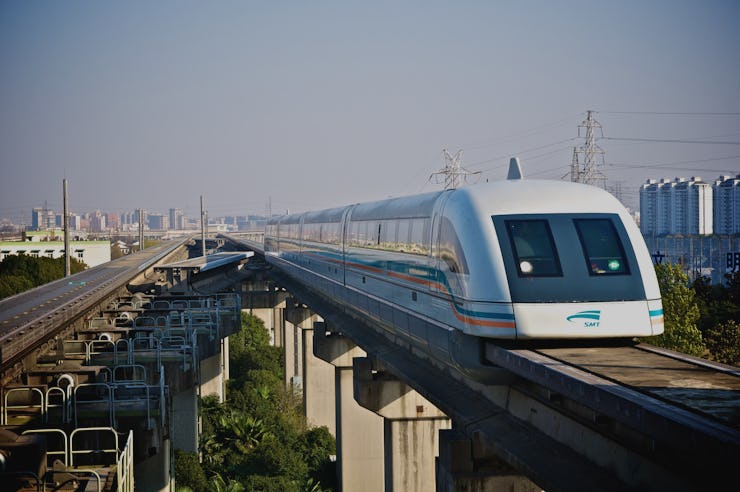Manchester may be getting a train that floats on magnets, reaching speeds of up to 350 miles per hour. Maglev trains have connected stations in Shanghai and South Korea, but for a number of reasons they’ve never quite taken off. But now, as British government body Transport for the North considers future infrastructure options, maglev could prove to be the ultrafast precursor to a global Hyperloop network.
“[Transport for the North] have been provided with information by Direct City Networks (DCN) PLC regarding a proposal to initially link Manchester and Leeds with a high speed ‘MagLev’ connection, with the possibility of this being extended to Liverpool and Hull,” a spokesperson for the government body told the Manchester Evening News in a story published Monday.
The maglev trains would beat out England’s other high-speed rail plan, High Speed 2, which will use more conventional trains at a top speed of just 250 miles per hour when it opens in 2026. But DCN’s maglev plans would be left in the dust by hyperloop, the vacuum-sealed train devised in a white paper released by Elon Musk in 2013. These trains could reach 700 miles per hour, but unlike maglev, there are no publicly running Hyperloop lines in existence.
DCN also claims to have experience working with Hyperloop too. Although the company is snubbing Musk’s rail invention, it could need his expertise for the tunnel boring section. DCN believes a straight tunnel connecting the two cities would be the most efficient option, and Musk’s new venture The Boring Company is specifically aimed at making tunneling simpler for improved infrastructure projects.
It wouldn’t be the first maglev system in England. In fact, the world’s first commercial maglev train debuted in Birmingham in 1984, ferrying passengers between the international airport and nearby train station, but it closed just 11 years later as it was unreliable.
The Birmingham maglev.
Another concern about the technology is that it’s pretty expensive. The Shanghai maglev cost around 1.2 billion yuan ($1.7 billion) for a 19-mile line that connects just two stations. The journey takes around eight minutes. For a technology that sees little global use, and with the potential for another Birmingham issue, it’s an expensive risk to take.
DCN’s plan is expected to cost up to £3.7 billion ($4.5 billion) and cut journey times from Manchester to Leeds down to nine minutes over a 57-mile distance, a journey that currently takes around 50 minutes. If it came to fruition, it would be an impressive cost saving. Transport for the North is exploring a more traditional high-speed rail option, which would cut journey times to 30 minutes but cost up to £10 billion ($12.2 billion).
The company will soon release a proposal to attract investment, but the initial plans seem promising. In a few decades, though, it could seem like an outdated oddity, especially if the world skips maglev for Hyperloop.
